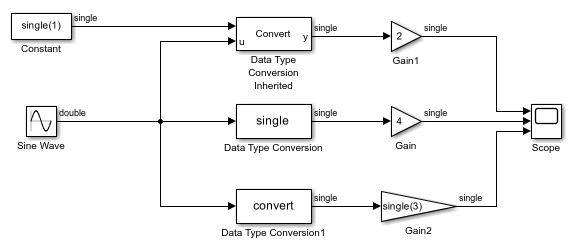Data Type Conversion Inherited
Convert from one data type to another using inherited data type and scaling
Libraries:
Simulink /
Signal Attributes
Description
The Data Type Conversion Inherited block converts one input to the data type and scaling of the other input. The first input is used as the reference signal. The second input, u, is converted to the reference type by inheriting the data type and scaling information. (For a description of the port order for various block orientations, see Identify Port Location on Rotated or Flipped Block.)
Inheriting the data type and scaling provides these advantages:
It makes reusing existing models easier.
It allows you to create new fixed-point models with less effort since you can avoid the detail of specifying the associated parameters.
Examples
Ports
Input
Output
Parameters
Block Characteristics
Data Types |
|
Direct Feedthrough |
|
Multidimensional Signals |
|
Variable-Size Signals |
|
Zero-Crossing Detection |
|
Extended Capabilities
Version History
Introduced before R2006a

